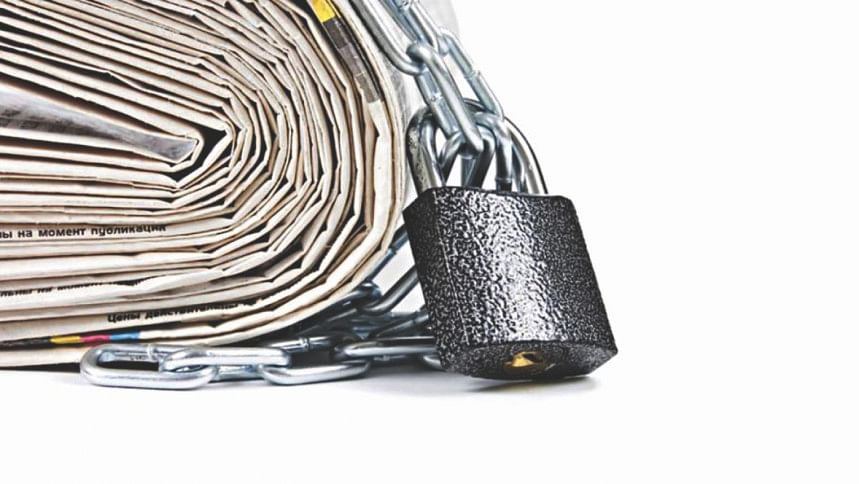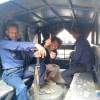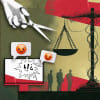Surrender of the fourth estate?

The media has been looked at both with derision and awe for its capacity to influence the public mind and hold the authority to account. It has also been accused of "misinforming" the public and overplaying its role.
But by and large, its importance in shaping the course of events and keeping the government in check, particularly when democratic institutions have been rendered impotent and condemned to the state of obsolescence by an authoritarian regime, has been acknowledged by most critics and scholars.
It is for good reason that the press (there was only the print media then) was daubed with the appellation of the "fourth estate", although there are differences of opinion as to whether it was Edmund Burke who first referred to the press as the fourth estate. But Burke made the reference in more of an apprehensive rather than a deferential tone as he is reported to have said, from the floors of the Palace of Westminster, according to Carlyle, looking at the press gallery, "there were Three Estates in Parliament; but, in the Reporters' Gallery yonder, there sat a Fourth Estate more important far than they all."
The occasion is worth noting too. It was the day that reporting of the proceedings of the House of Commons was allowed for the first time. In other words, he ascribed the same degree (if not more) of importance to the newsmen as had been accorded to the other three "Estates of the Realm," i.e. the Sovereign, the Lords and the Commoners.
Since then, the term "fourth estate" has become a metaphor for the power of the media. The term has also come to imply the separation and importance of a part of the society that represents public interest and holds the government and the political party, which the people have chosen by free will to run their affairs, to account if the policies of the government run contrary to the interest of the public. That is why the American characterisation of the media being the fourth organ of the state does not sit well with those who want to assert the separation of the two.
The media plays a very important role—that of a watchdog over the institutions of power, pundits assert, be they political, economic, social or military, while performing its duty of informing the people of what the government and the various agencies under it are doing. It is the conduit between the government and the people, not above accountability though, but the primary loyalty lies with the people they serve.
And that, unfortunately, is where the complexity of the situation emerges, because, being loyal to public interest, more often than not, is seen as being an adversary to the powers that be. Thus, the constant effort by the establishment to suppress the media, sometimes openly and sometimes veiled behind the excuse of national security and national interest, as if national security transcends public security and public interest.
Regrettably, journalists are the most endangered species in the world today. But that in no sense should suggest that it has been able to acquit itself in all circumstances as the voice of the people. In some countries, a robust independent media has succumbed to the pressure and direct and indirect coercion of the state from time to time.
In recent times, the media has come to be described as the "enemy of the people" by the US president (although he is not the first to describe the media as such). This, in a country that holds the First Amendment to its constitution as much consecrated as the scripture, is unthinkable.
The American media is noted for bringing to public notice many of the policies that were against public interest in the recent past and forcing the administration to re-address the issues. But in the US too, for example, the New York Times had resisted presidential pressure to suppress the news of the impending invasion of Cuba and to put the interest of the country foremost because the government considered letting the public on, on the Kennedy plan, would endanger the interest of the US much more than if the news was kept secret. But in the US too, the powerful media had succumbed to the government from time to time, for example in selling the Bush-Cheney-Rumsfeld triumvirate's fake stories of Iraq's nuclear capability and fuelling the Iraq War. The consequences of a pliant media are being suffered by the countries of the region particularly, and the world at large. Contrast this with the role of the US media and its coverage of the Vietnam War. The conclusion of that war was hastened by the true representation of the war and the developments in the battlefield by a ubiquitous media—not embedded though—which presented the people of America with the actual situation on the ground.
A dissenting media in the largest democracy in the world, governed by a popularly elected government, has come under severe strain too. And as a media critic says, "As Modi faces a weakened economy at home and increased communal tension across the country, the prime minister and his party moved to hijack the country's historically free press. The government has not created an official state-run news service, but instead relies on independent news organisations to peddle its economic narrative, chastise a Muslim minority, and prey on Hindu anxieties in the country." The media is coerced sometimes by temporary closure of some outlets or subjected to litigations by the billionaire businessmen of the ruling party, a feature not new to us either.
While in some countries the media has resisted such attempts successfully, in some, journalists have fallen in line with the government. While we have seen everything that could be done to curb media freedom in Bangladesh—from the ICT Act to the Digital Security Act and the proposed Broadcast Act, and a few dissenting voices muted through various means—a large section of the media in the country has chosen discretion as the better part of valour and become, literally, an integral part, an appendage, of the powers that be.
While no one is apolitical, and newspapers around the world have been known to express support for particular political parties or presidential candidates, what forebodes a dangerous future for the media in Bangladesh is a situation where journalists engage in open politicking for political parties. Our journalist community, like the rest of the nation, is also divided, but one was not prepared to see them canvassing in public.
The purpose of separating the different branches of the state is to exercise checks and balances, without which no democracy can thrive, let alone become robust. And the media as the "fourth estate" plays the watchdog role over all others. But when the separation is forcefully breached and the difference diluted, they are subsumed within each other, and the concoction of disparate "chemicals" becomes a dangerous mix, with imponderable outcomes.
When journalists become a part of the establishment, one that they are supposed to hold to account for its actions and inactions, they forfeit their moral authority to play that role, and, instead of being a "watchdog" for the people, they become a "lapdog".
Brig Gen Shahedul Anam Khan, ndc, psc (retd) is Associate Editor, The Daily Star.










Comments